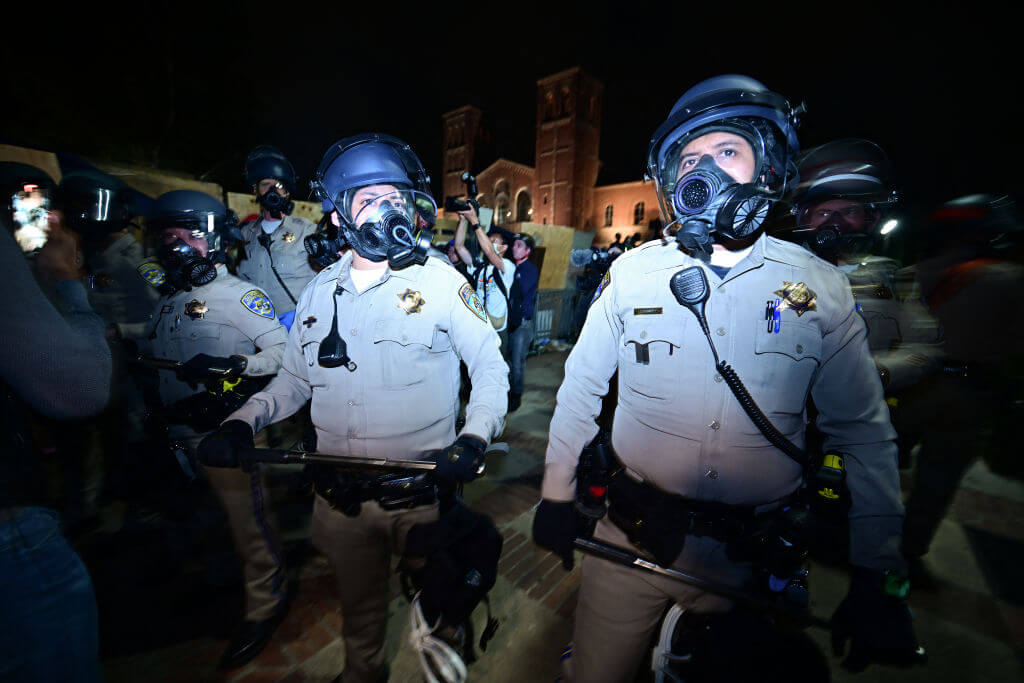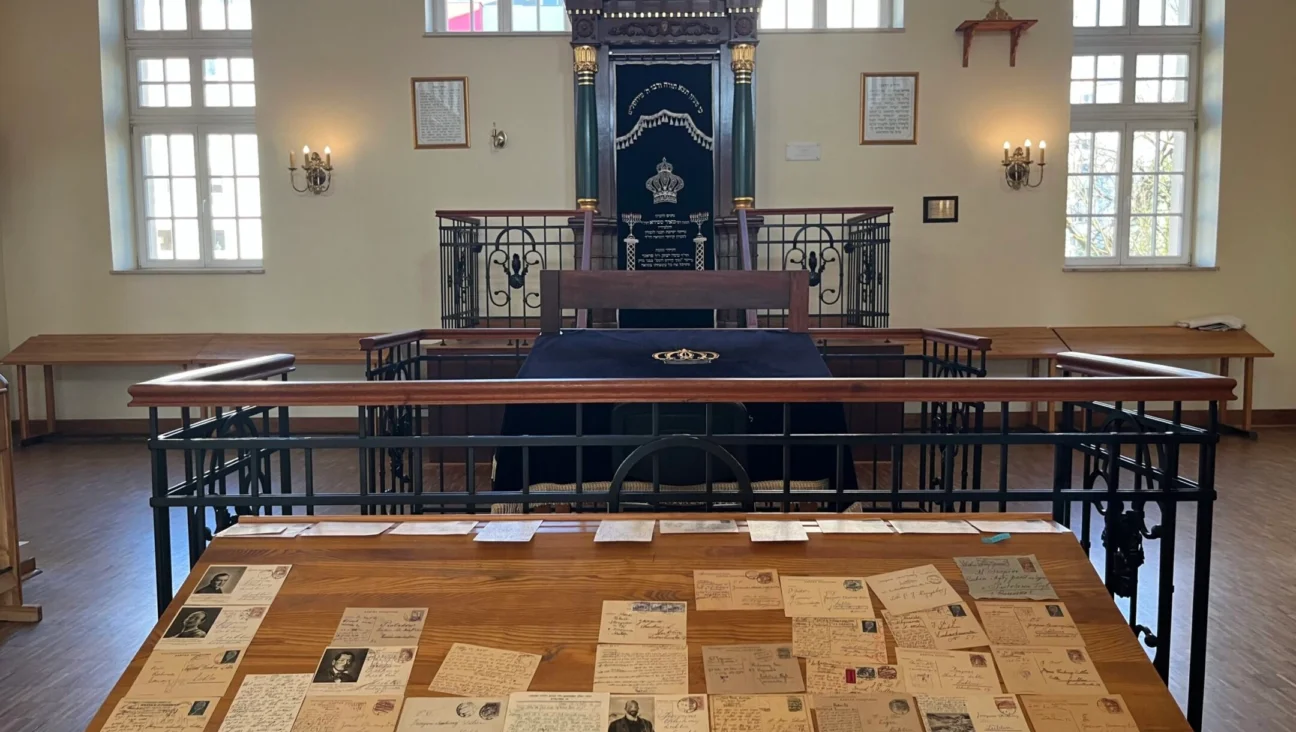‘I Have Stopped Wearing My Magen David’: 27 Jews On What It Feels Like To Be Afraid For Their Lives

Image by Sefira Lightstone
If you feel your eyes watching the exit during Shabbat services, if you see danger lurking at Jewish celebrations and events, if you’ve felt the metallic cold of a Magen David as you tuck it into your shirt “just in case,” you’re not alone.
In a recent survey of American Jews by the American Jewish Committee, 1 in 4 respondents said that they “avoid certain places, events or situations out of fear” for their “safety or comfort as a Jew.” Nearly a third of the more than 1,200 respondents said they avoided “publicly wearing, carrying or displaying things that might help people identify” them as Jewish.
We wanted to hear the stories behind these numbers, so we asked readers to write in and describe when and why they had avoided places or public displays of their Jewishness. Many mentioned removing or concealing kippot. Others expressed particular fear for children, elderly people, and ultra-Orthodox Jews whose traditional dress makes them stand out. And some raised the concern that their pro-Israel activity would be met by anti-Jewish aggression.
Though we asked for anecdotes about things people did avoid, a few wrote to say that rising fear has made them defiant, determined to display their identity.
“I want to be MORE visible as a way of showing that hate won’t keep me from being proud of my heritage,” wrote Jay, a 49-year-old from Eugene, Oregon.
“I put up the sukkah yesterday in front of my Squirrel Hill house,” wrote Lorraine, a 57-year-old from Pittsburgh. “For the first time ever, I wondered if it were wise to put it in the front where it’s always been. I’ll admit that I started building it in the side yard, but the ground was sloped. So, post-shul-massacre, I’ve identified our house. Come what may.”
In all, readers from 17 states as well as Canada, the UK, Israel, and Washington, DC wrote in. They spanned from age 19 to 83, and included every major denomination.
Below are some of these readers’ stories, edited for length and clarity.

Image by Sefira Lightstone
‘I have stopped wearing my Magen David’
I consciously stopped wearing my hamsa necklace. My decision was 100 percent fueled by the uptick of anti-Semitic attacks in the U.S. and world in recent years. I feel conflicted because part of me wants to proudly represent that portion of my identity and not feel like I’m “in hiding” or “ashamed” or any other victim-oriented emotion.
— Leah, 25, Washington, D.C., Conservative
I have stopped wearing my Magen David, as has my daughter. I cringe when my husband or any of my children wear a T-shirt with a Magen David or Hebrew.
— Claire, 56, San Francisco, Reform
My daughter has been regularly wearing her Hebrew-name necklace and I’ve been tempted to ask if she thinks that’s a good idea, but I have held back, because it just feels so wrong. And I also count on the fact that most folks won’t know what the necklace is. But she is very outspoken, on all kinds of social and political issues, and I do worry that she could easily become a target.
— Nina, 56, New York, Conservative
‘I feel worse when I hide who I am’
Last August, I took my family to a local festival in Ohio. As I walked around the festival with my family, I began to wonder if these types of folks might be the types of folks who would welcome in a white nationalist, or a white supremacist. For the first since I began wearing a kippah on a daily basis nearly 20 years ago, I wondered if this was a wise decision. I quickly realized that I was not afraid, and was proud to display my Jewish identity there. But my wife and my son had not made the same considerations I had. Was my public display of my Jewish identity, possibly risking their safety? My son needs a dad tomorrow, no matter what. My wife needs a husband tomorrow no matter what. A few weeks later, when we all went to the local county fair, I wore my Dodgers baseball cap over my kippah.
— Michael, 59, Beachwood, Ohio, Reconstructionist

Image by Sefira Lightstone
Based on prior experience, I would never wear a kippah alone while taking the NYC subway. I would wear it in a group of two or more men, but be ready for verbal or physical confrontation, as I have experienced both. Hasidim don’t have the choice to take off their kippot. They can’t exit into their neighborhoods in regular street clothes and a baseball cap like I can.
— Steven, 47, New York, Modern Orthodox
I wear a kippah everywhere so this HAS made me think twice when attending certain events. The only time I think I will now remove it is when I travel to certain places out of the country, especially if I am with others. I’ve thought, “Is it right to put others “at risk” because of my outward display of my faith?
— Norman, 77, Montclair, New Jersey, Reform
As a Neo-Hasid, I cannot hide who I am, as I always have a kippah and tzit-tzit on. Sometimes I do wear a conservative kippah instead of my Na Nach, but I am always visibly Jewish. It has led to me facing anti-Semitism on a regular basis, but I feel worse when I hide who I am.
— Surene, 42, Minneapolis, Minnesota, Neo-Hasid
I do walk with my kippah in my own neighborhood, but it does cause me to think about the fact that in other public places — airports, especially — I remove all symbols of my Judaism. And it certainly does give me pause to put my name on this survey and push submit! I certainly don’t trust anything with Google attached to it. But I think this is good info for the Forward to gather.
— Julie, 63, Seattle, Washington, Conservative

Image by Sefira Lightstone
‘Through the whole service, all I could focus on was the door.’
Whenever I go to synagogue, I always sit on the side farthest from the stained glass windows, in case someone on the street outside decides to lob something through them.
— Rachel, 64, Vallejo, Ca, Non-denominational
I didn’t attend Yom Kippur services at shul this year. I went for Rosh Hashanah, but for some reason wasn’t feeling good about going on Yom Kippur, part of which is because I think a terrorist would love the symbolism and meaning of Yom Kippur as part of their psychotic plan. I do continue going on Shabbat but the thought is always in my mind and often times, during service, I will start thinking about an escape plan and how I would try to save my friends and community members. I think about how impossible it will be to get some of the elderly members out fast enough and I am concerned for their safety.
— Anonymous, 30, Boston, Massachusetts, Conservative
I did not attend synagogue this year on Yom Kippur, after hearing/reading about the attack on the synagogue in Halle, Germany, earlier that day. In general, I now refuse to attend any synagogue that does not have an armed guard.
— Shoshana, 50, New York, Traditional
I was hesitant to go to Shabbat services after the Tree of Life shooting. I did end up going, because my college’s Jewish Community is one of my happiest places, but I was scared the whole time. It was stuffy in the room we were in, so someone propped open the door with a milk crate. Through the whole service, all I could focus on was the door. I felt that if someone tried to come in and hurt us we wouldn’t have any warning since we wouldn’t hear the door open. I kept my eye on the door the whole evening and couldn’t focus on the service at all.
— Sydney, 20, Montclair, N.J., Reform

Image by Sefira Lightstone
‘I’m perpetually afraid of going to Jewish events because of the risk of a shooting.’
There’s a Federation day at the baseball stadium here in D.C. I won’t go. I don’t need to be in a public place packed with that many Jews. I went once and will never go again. I couldn’t get comfortable.
— Lisa, 37, Washington DC, “Conservative-ish”
Traveling through Brooklyn, I’d often take buses in areas such as Crown Heights, East Flatbush, etc. I now avoid these areas due to the surge of anti-Semitic attacks in these neighborhoods. I’m very conscious about avoiding urban areas as much as possible.
— Daniel, 28, Brooklyn, Orthodox
One of the temples to which I belong is in a changing neighborhood and I worry about walking it with my yarmulke or tallis bag.
— Edward, 73, Pennsylvania, Trans-denominational
There was a Jewish event nearby following the Pittsburgh shul shooting. The purpose was a public show of solidarity, but I’m perpetually afraid of going to Jewish events because of the risk of a shooting. I’m careful about wearing any Jewish objects or symbols. Earlier in the year, I was followed and threatened at a pub when I wore a Yiddish T-shirt.
— Michael, 28, Boynton Beach, Fla., “Just Jewish”
I bought Bari Weiss’ new book, popped it open on the NYC subway and realized I was afraid to be seen reading it…In New York! On a Brooklyn-bound train!
— Sarah, 28, Brooklyn, N.Y., Modern Orthodox
Since it is important for me to be part of the Jewish community, and it is vital for the community that Jews stay connected, I don’t let myself seriously think about not attending events. I have family members who are visible in the community and worry about them much more actively in recent months. My cell phone is usually with me — I would especially never attend a public Jewish event without having my cell phone with me.
— Anonymous, 70, Boston, Non-Denominational
‘I’m not taking any chances.’
In high school, I was on the archery team. We would travel down state (in Illinois) some weekends during the season and some of the schools just felt…. uncomfortable. I remember specifically at one school my junior year in high school there was a man, likely the father of a participant, wearing a shirt with a Confederate flag on it. I made sure that my Star of David was tucked into my shirt and avoided walking anywhere without a teammate for the rest of the day.
— Shelley, 19, Lincolnshire, Ill., Reform/Conservative
The Swastika has been painted in and around Eugene, Oregon. The Klan used to be here. I have not worn my Star of David because of possible problems. I do not wear my yarmulke out, but a plain hat. In this state you can wear a gun out in plain site – I’ve seen this at Walmart and Fred Meyers stores. With all of what is going on I’m not taking any chances.
— Randy, 67, Springfield, Ore., Reform

Image by Sefira Lightstone
‘I consider anti-Zionism today’s form of anti-Semitism.’
1) When I stopped at a gas station in West Virginia, there were shirts with a swastika on them. That’s where I felt unsafe showing anything Jewish. I went back to the car out of fear
2) People know I’m Israeli at Earlham College, but I feel unsafe to do any public Israeli advocacy there, out of true fear for my safety.
— Achiad, 21, Richmond, Indiana, Traditional (Israeli)
I consider anti-Zionism today’s form of anti-Semitism. I am former president of San Diego Progressive Democratic Club, and did not run for re-election this year because this anti-Israel ideology is popular with many newer, younger members of the club and I felt it would be a better use of my time to address anti-Semitism in more supportive environments.
— Andrea Beth, 60+, La Mesa, Calif., Renewal/Reform
During SXSW 2019 I wanted to check out an art instillation showing the atrocities occurring at detention facilities. When I realized it was run by a leftist group that supports BDS I knew I couldn’t go in there wearing my Star of David necklace without conflict. I ended up not going in.
— Shirley, 29, Austin, Texas, Conservative
I find the place I get the most hate from as Jew is my synagogue, when I challenge Israel’s right to do as it pleases. The most anti-Semitic people in the world are my fellow Jews. Please refer to Orthodox rabbis name-calling Reform Jews, such as “spiritual terrorist.”
— Anonymous, 65, Sacramento, Calif., Conservative

Image by Sefira Lightstone
‘My mom doesn’t like that I keep a mezuza on the front door’
My son is a Judaic Studies major at college. Recently, a sales person was making small talk and asked about my children. When he asked what my son was majoring in college, I responded, “computer science.”
— Peninah, 43, Silver Spring, Maryland, Modern Orthodox
I stopped shopping at a grocery store after two separate cashiers made anti-Semitic wink-wink nudge-nudge jokes to me about Orthodox Jewish customers in the store (They didn’t realize I was Jewish.)
— Anonymous, 40, Chicago, Non-religious
It was three and a half years ago. I was 22 and a leader in my Jewish Student Association. I had been sexually assaulted by another student. I went to the campus police and the officer asked me “Were you not dating him because he isn’t Jewish?” When I’m around white cops now I tuck in my Magen David and never mention being Jewish. I work for a Jewish campus organization now. Every time a stranger asks me what I do for a living I lie and say “student advising.” And my mom doesn’t like that I keep a mezuza on the front door. I had to place it in a kosher way that still makes it hidden by the screen.
— Ruth, 25, Conservative
A message from our Publisher & CEO Rachel Fishman Feddersen

I hope you appreciated this article. Before you go, I’d like to ask you to please support the Forward’s award-winning, nonprofit journalism so that we can be prepared for whatever news 2025 brings.
At a time when other newsrooms are closing or cutting back, the Forward has removed its paywall and invested additional resources to report on the ground from Israel and around the U.S. on the impact of the war, rising antisemitism and polarized discourse.
Readers like you make it all possible. Support our work by becoming a Forward Member and connect with our journalism and your community.
— Rachel Fishman Feddersen, Publisher and CEO























